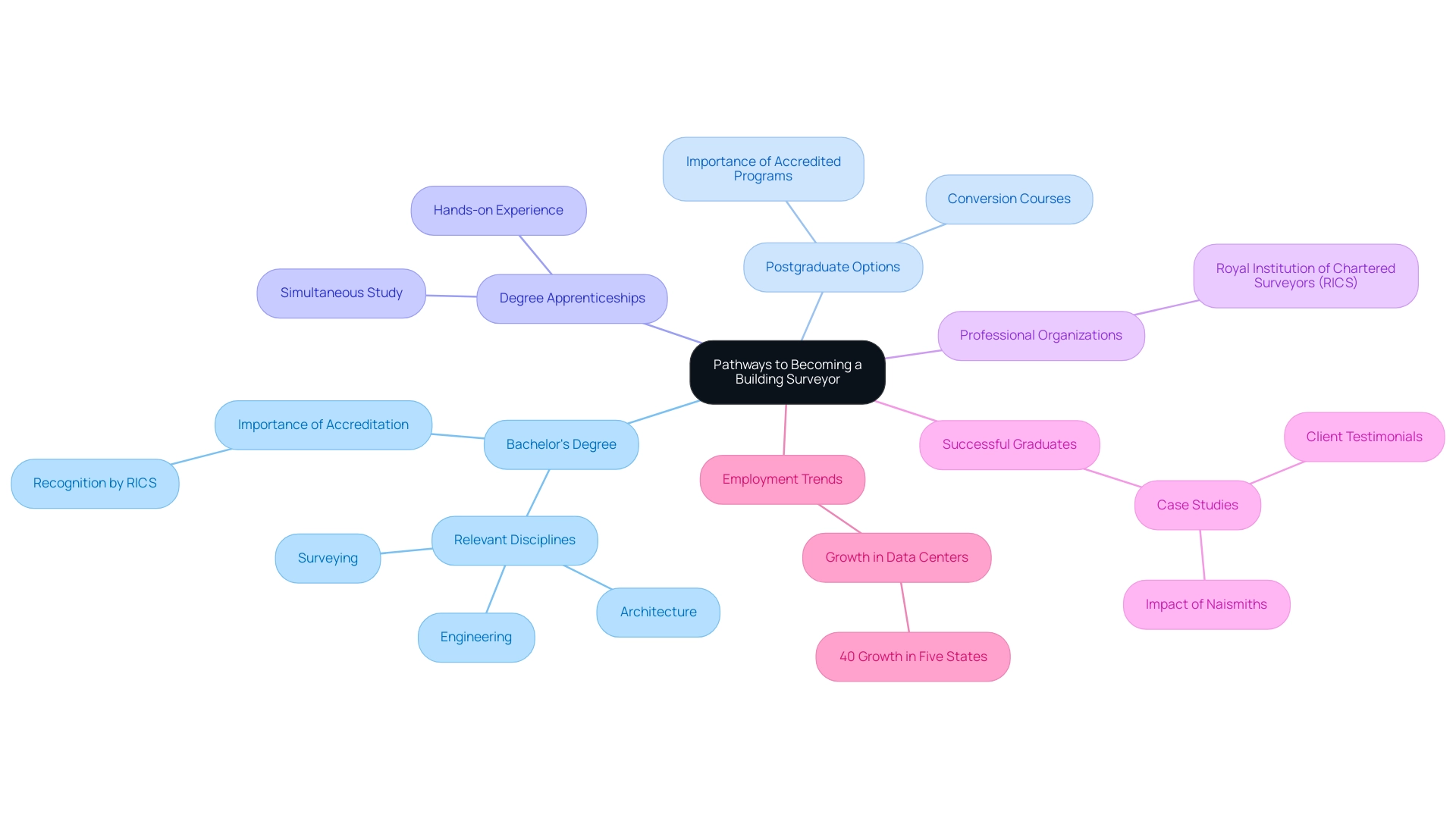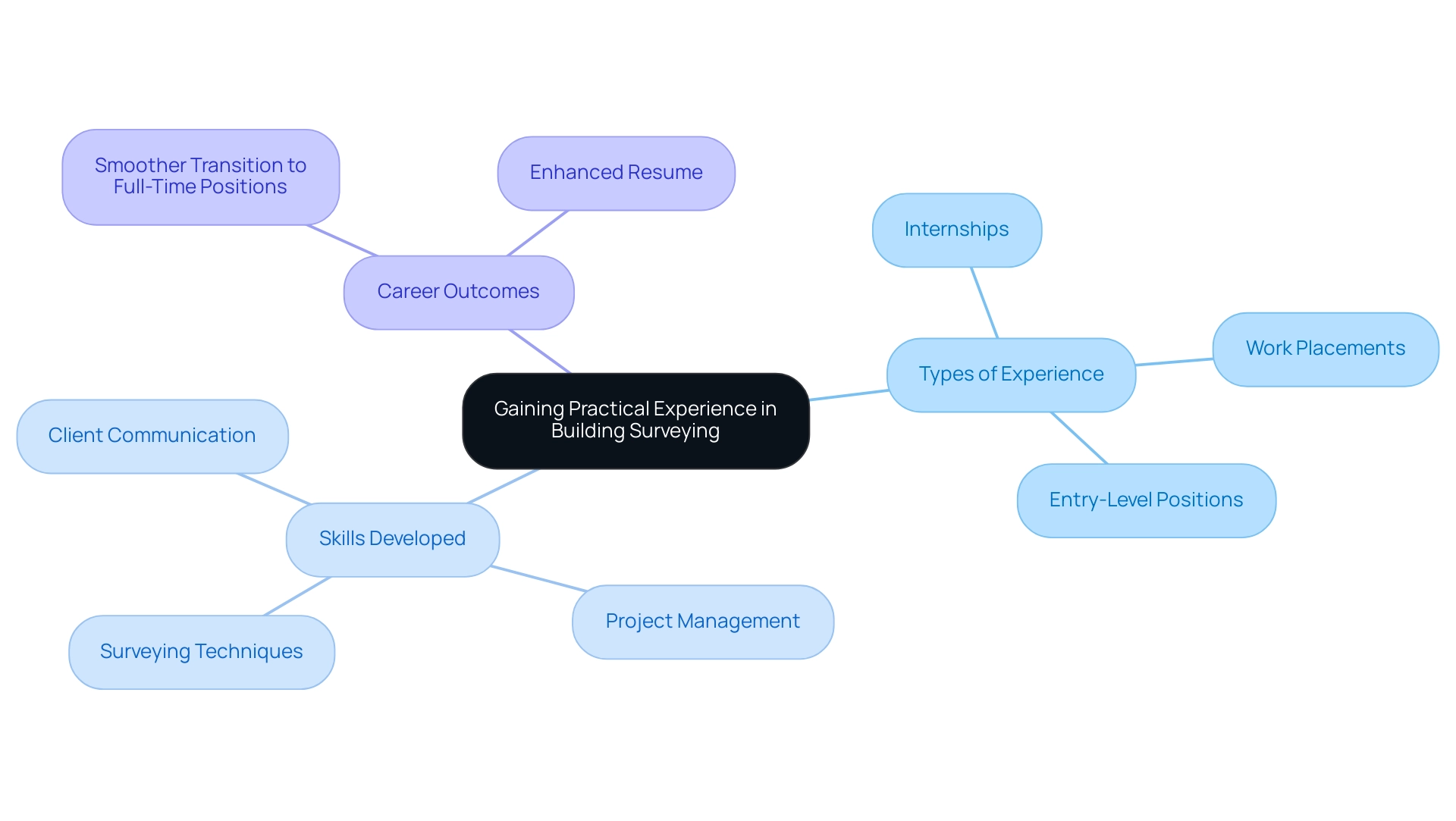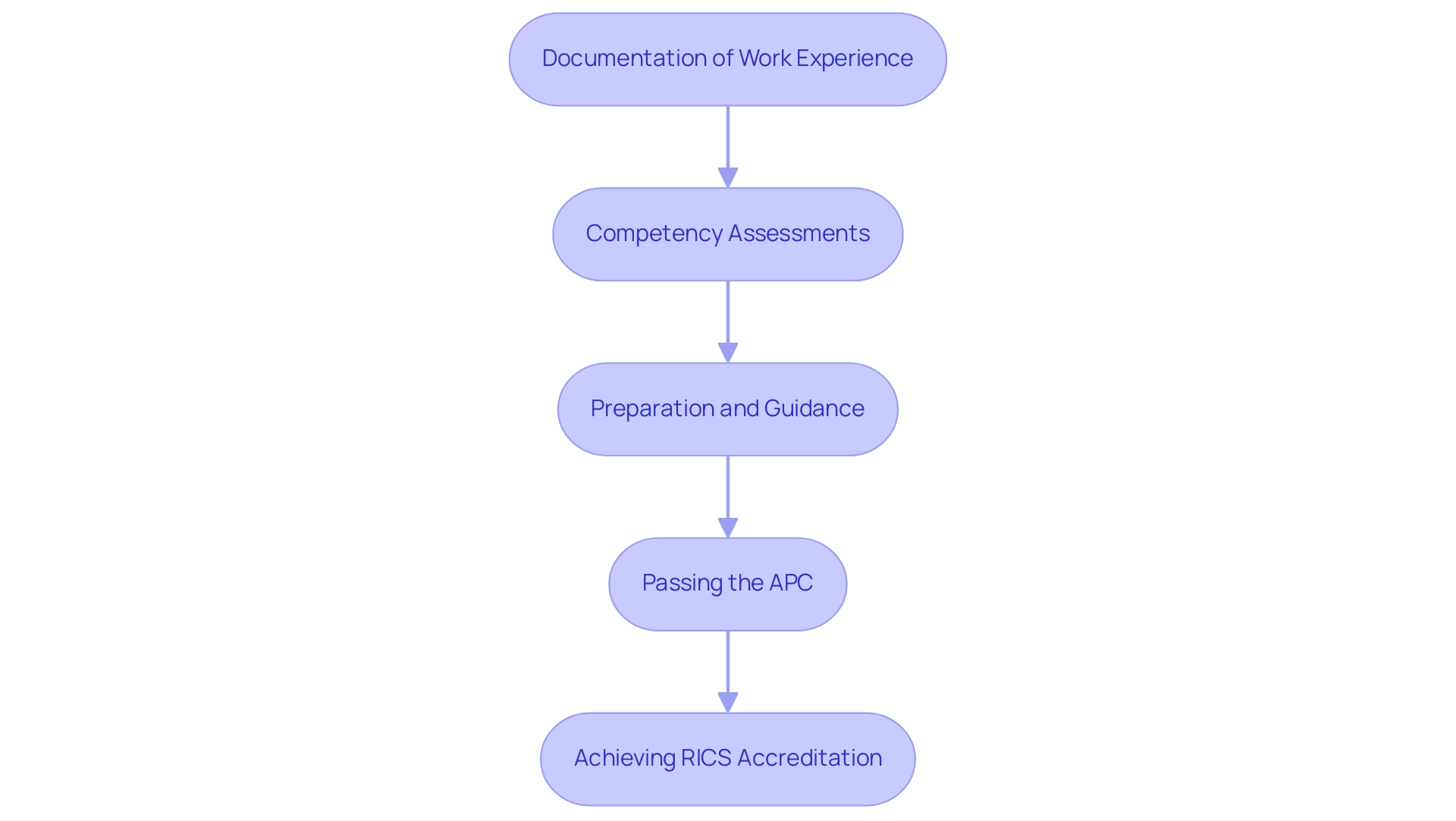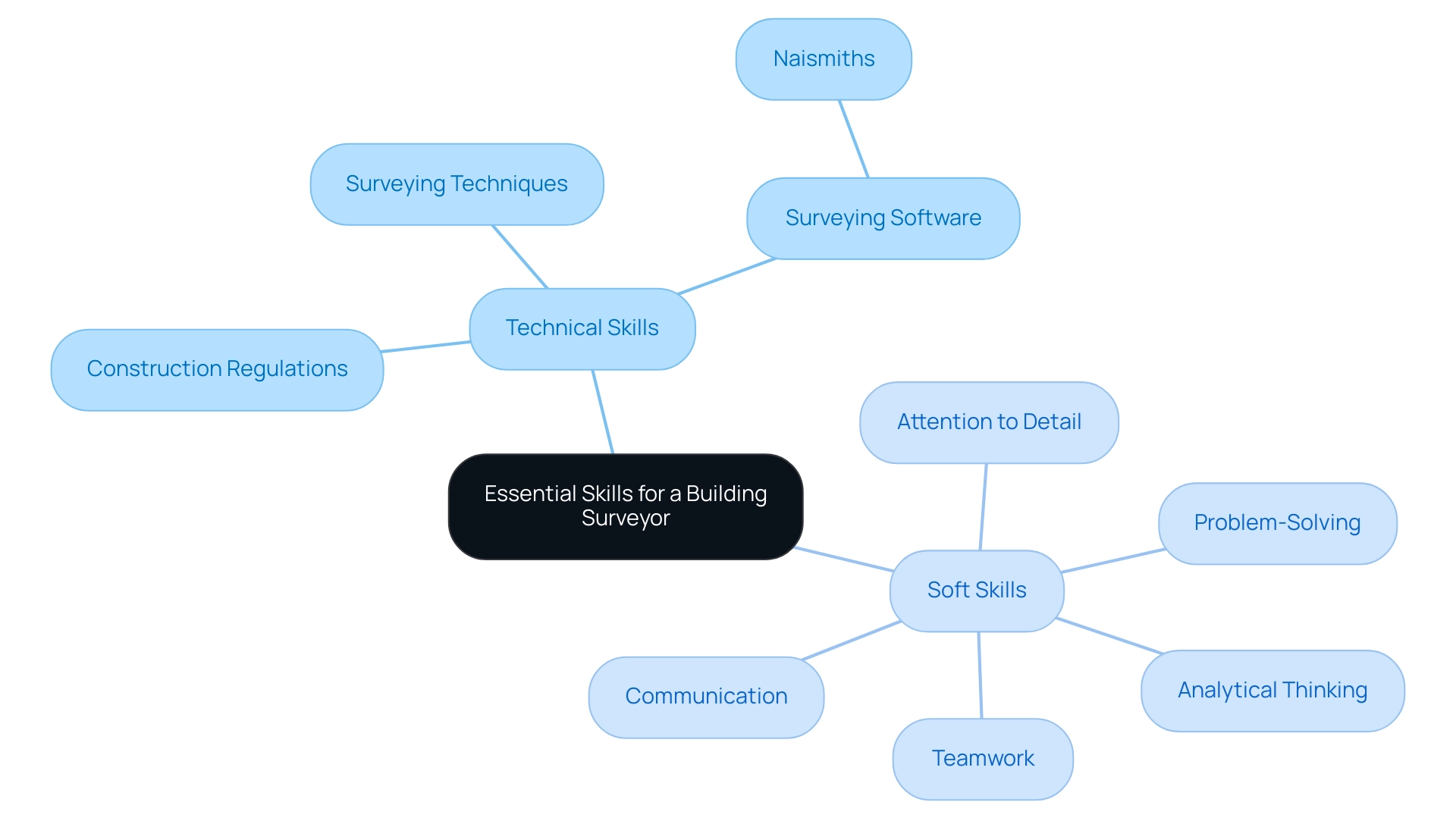
Overview
To become a building surveyor, individuals must typically obtain a relevant bachelor’s degree, gain practical experience, and achieve professional qualifications such as RICS accreditation. In today’s evolving field, a combination of formal education, hands-on internships, and the development of both technical and interpersonal skills is essential for success. Furthermore, the growing demand for skilled professionals in construction highlights the importance of these qualifications. Engaging in this profession not only opens doors to a rewarding career but also addresses the pressing need for expertise in the industry.
Introduction
In the ever-evolving landscape of the construction industry, the role of building surveyors has emerged as a cornerstone of project success and safety. As experts in assessing and advising on the condition of structures, these professionals navigate a complex web of regulations, compliance, and innovative technologies to ensure that buildings are not only functional but also sustainable. Furthermore, with the integration of generative AI and the increasing demand for skilled surveyors, the profession is poised for significant growth.
This article delves into the multifaceted responsibilities of building surveyors, the educational pathways to entering this vital field, and the essential skills required to thrive. It also highlights the promising career prospects and earning potential that await those who choose to embark on this rewarding journey.
Understanding the Role of a Building Surveyor
A building surveyor is an essential expert in the construction sector, tasked with evaluating structures and guiding individuals. Their responsibilities encompass conducting thorough inspections, ensuring adherence to construction regulations, and providing expert guidance on maintenance and repairs. As we approach 2025, the role of building surveyors has become increasingly crucial, with statistics indicating a significant impact on management results, particularly in complex developments.
Understanding how to become a building surveyor involves engaging in a diverse array of projects, ranging from residential homes to expansive commercial developments, ensuring that all structures are safe, functional, and compliant with legal standards. Their role extends beyond inspections; they are pivotal in management by overseeing construction processes and facilitating communication among clients, contractors, and regulatory bodies. Naismiths exemplifies this role through their comprehensive services, which include:
- Dilapidations advice
- Defect diagnosis
- Technical due diligence
- Pre-acquisition surveys
- Planned preventative maintenance
These are critical components in managing risks and ensuring success.
As the construction field evolves, their expertise not only enhances the quality of construction projects but also contributes to the overall efficiency and safety of the built environment. In light of recent developments, including the implementation of Performance Standards and Minimum Energy Efficiency Standards, the role of structure inspectors is more critical than ever in guiding projects toward compliance and sustainability, with Naismiths’ services directly addressing these challenges.
Educational Pathways to Becoming a Building Surveyor
To embark on a career as a building surveyor, individuals typically need to secure a bachelor’s degree in a relevant discipline such as architecture, engineering, or surveying. For those whose initial degree lies in a different field, pursuing a postgraduate conversion course presents a viable option. Moreover, degree apprenticeships are gaining traction, enabling candidates to acquire hands-on experience while simultaneously engaging in their studies.
Selecting an accredited programme is paramount, as it guarantees recognition by professional bodies like the Royal Institution of Chartered Surveyors (RICS), which is essential for obtaining professional qualifications. As of 2025, numerous accredited building surveying programmes are available across the UK, reflecting a growing emphasis on quality education in this field.
Statistics reveal that 86% of graduate online students believe the value of their online degree equals or surpasses their investment, underscoring the importance of selecting programmes that offer both academic rigor and practical relevance. Furthermore, insights from RICS representatives highlight the significance of accredited programmes in equipping students to meet the demands of the profession.
‘Naismiths’ expertise is exemplified through their oversight of the development projects. Their customer-focused strategy emphasises risk management and teamwork, ensuring that all parties achieve optimal results while upholding high-quality standards throughout each endeavour.
Case studies illustrate successful educational pathways for surveyors, showcasing how graduates from top universities have excelled in their careers. Institutions recognised for their excellence in surveying education include several leading universities in the UK, which offer robust programmes designed to equip students with the necessary skills and knowledge.
In summary, aspiring construction specialists should concentrate on obtaining a relevant degree and consider postgraduate options if necessary, while prioritising accredited programmes to ensure a strong foundation for their careers. Moreover, with the recent employment expansion in data centres, the significance of construction professionals’ skills in a developing sector further emphasises the need for quality education in this area.

Gaining Practical Experience in Building Surveying
Practical experience is essential for those aspiring to become a building surveyor. Engaging in internships, work placements, or entry-level positions within surveying firms or construction companies is crucial. These opportunities not only provide exposure to real-world tasks but also allow candidates to apply their theoretical knowledge in practical environments.
A significant 30% of companies report that their employees possess the necessary skills; however, many struggle to understand the current workforce capabilities, underscoring the need for hands-on experience.
Many building surveyors begin their careers as assistants or trainees, gaining valuable skills through direct learning from seasoned professionals. Mentorship is vital for developing essential skills in surveying techniques, project management, and effective client communication. As the construction sector evolves, particularly with anticipated moderate growth in 2025 driven by improving economic conditions and government investments, the demand for skilled professionals capable of navigating these changes is expected to rise.
Internships play a pivotal role in this journey. They enhance a candidate’s resume while offering invaluable insights into the daily operations of the field. Success stories abound, with numerous surveyors crediting their internships as the launching pad for their careers.
For instance, individuals who have completed internships frequently report a smoother transition into full-time positions, equipped with practical skills and a deeper understanding of sector dynamics.
Expert opinions consistently underscore the importance of practical experience in surveying. As the industry adapts to new challenges and opportunities, aspiring professionals must prioritise gaining relevant experience through internships and entry-level positions.
This proactive approach not only enriches their professional journey but also positions them favourably in a competitive job market, ensuring they are well-prepared to meet the demands of the evolving construction landscape. Furthermore, with 92% of survey respondents believing that training goals should reinforce a positive employee experience, the significance of internships is further underscored, highlighting their role in fostering a supportive and growth-oriented environment.

Achieving Professional Qualifications and Certifications
Acquiring professional qualifications is essential become a building surveyor and practise as a qualified surveyor, with the RICS accreditation recognised as the most respected certification in the sector. As we approach 2025, the RICS accreditation process remains a benchmark for aspiring professionals, requiring candidates to successfully complete the Assessment of Professional Competence (APC). This rigorous process combines practical work experience with a series of assessments designed to evaluate a candidate’s competencies across various aspects of surveying, including maintenance, defects, compliance, and project management.
Candidates are encouraged to meticulously document their work experience, as this is a vital component of the APC. By showcasing their skills and knowledge in real-world scenarios, candidates can effectively demonstrate their readiness for the challenges of the profession. Achievement in the APC not only greatly enhances career opportunities but also establishes a solid foundation of trust within the sector, particularly regarding investment and risk management, as construction professionals play a crucial role in safeguarding financiers and investors financially.
Recent statistics indicate that the pass rates for the APC in 2025 show an increasing trend of successful candidates, underscoring the impact of preparation and guidance in this journey. Significantly, success stories from construction inspectors who have navigated the APC process highlight the importance of thorough preparation and the value of professional guidance. Insights from sector experts reinforce that a well-structured approach to the APC can lead to successful outcomes, emphasising that dedication and strategic planning are key to achieving RICS accreditation.
As the construction landscape evolves, the RICS accreditation process continues to adapt, ensuring that those learning to become a building surveyor are equipped with the necessary skills to meet contemporary challenges. This commitment to professional development not only benefits individual careers but also enhances the overall quality and standards within the industry, which is crucial for investment fund managers assessing viability.
In December each year, The Statistics Platform holds a Plenary Meeting, serving as a significant event for discussing industry trends and benchmarks related to RICS accreditation. This approach illustrates how aspiring building surveyors can navigate the APC process effectively.
For international candidates contemplating their educational routes toward RICS accreditation, UCL provides Undergraduate Preparatory Certificates (UPC) to assist those who do not fulfil direct entry requirements. This initiative can serve as a valuable stepping stone for aspiring construction professionals looking to learn how to become a building surveyor and enhance their qualifications in preparation for the APC.

Essential Skills for a Successful Building Surveyor
Successful construction professionals exhibit the essential skills required to become a building surveyor, distinguished by their mastery of both technical and interpersonal competencies, which are crucial for navigating the complexities of the profession. Key technical competencies encompass a comprehensive understanding of construction regulations, methodologies, and advanced surveying techniques. Proficiency in utilising surveying software and tools, such as those provided by Naismiths, is critical; these technologies streamline processes and enhance accuracy in assessments.
Naismiths’ platform offers thorough solutions for precise cost information, performance evaluation, and risk management, empowering professionals to make informed decisions throughout the development process. The platform features an intuitive interface, facilitating clear, standardised reporting and analysis. Additionally, the interactive dashboards and bespoke reports provide tailored insights that are vital for investment fund managers overseeing projects.
Equally vital are the soft skills that foster effective collaboration and communication with diverse stakeholders. Skills such as problem-solving, teamwork, and effective communication are paramount, as surveyors frequently engage with clients, contractors, and regulatory bodies. Attention to detail and analytical thinking are essential for assessing building conditions and creating accurate reports.
In 2025, the emphasis on soft skills has become increasingly pronounced, with industry leaders highlighting their importance in achieving successful results. This customer-centric approach, exemplified by Naismiths, reinforces the connection between soft skills and successful project delivery.
Statistics reveal that 17% of small businesses are now utilising virtual classrooms for training, underscoring the growing trend of integrating technology into professional development. This shift not only enhances technical skills but also nurtures the soft skills necessary for effective communication and teamwork in a digital environment, which is increasingly relevant in today’s evolving workplace.
Professionals who adeptly merge technical knowledge with strong interpersonal abilities are better equipped to navigate challenges and deliver exceptional results.
As the sector advances, the demand for experts who can balance these skill sets will only grow, emphasising the importance of developing both technical knowledge and interpersonal abilities. Moreover, staying informed about sector trends, including the increasing focus on ESG-related matters, is vital for professionals to remain relevant and efficient in their roles.

Career Prospects in Building Surveying
The career opportunities for building surveyors are exceptionally promising, driven by a robust demand for skilled professionals within the construction sector. As urban development accelerates and regulatory frameworks tighten, the necessity for qualified professionals in surveying is projected to increase significantly.
Industry analysts note that the construction sector is experiencing a significant shortage of skilled labour, with an estimated need for 439,000 new workers in 2025. This shortage not only emphasises the urgent need for surveyors but also indicates that those entering the field can anticipate favourable job security and opportunities for advancement.
This viewpoint underscores the importance of collaboration in developing surveying careers.
Moreover, the case study titled “Employment Trends in the Construction Sector” illustrates the sector’s growth and the challenges in hiring, reinforcing the discussion on job security and opportunities for advancement in surveying. Ongoing concerns about workforce quality and rising labour costs further highlight the dynamic nature of the construction sector. As the construction industry continues to evolve, understanding how to become a building surveyor remains a lucrative and rewarding career choice, offering a blend of stability and growth potential.
Conclusion
The role of building surveyors is undeniably pivotal in shaping the future of the construction industry. Their expertise in assessing structures, ensuring compliance, and facilitating effective project management significantly contributes to the safety, functionality, and sustainability of buildings. As the industry continues to evolve, the demand for skilled surveyors equipped with both technical proficiency and soft skills is on the rise, presenting numerous opportunities for career advancement.
Educational pathways for aspiring building surveyors have become more accessible. Accredited programmes and hands-on experiences are paving the way for success. The journey to professional qualifications, particularly through esteemed certifications like the RICS accreditation, underscores the importance of dedication and strategic preparation in this field. Furthermore, the integration of practical experience, such as internships and mentorships, is essential for developing the competencies needed to excel in a competitive job market.
Looking ahead, the career prospects and earning potential for building surveyors remain promising. This is driven by the ongoing growth in urban development and the increasing complexity of projects. With a strong emphasis on collaboration, risk management, and adherence to high-quality standards, building surveyors are positioned not only for stable careers but also for meaningful contributions to the built environment. As the industry adapts to new challenges, the importance of building surveyors in navigating these changes cannot be overstated. Thus, this profession stands out as an attractive and rewarding choice for future generations.